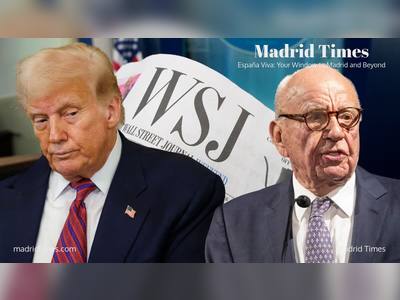Germany’s Economic Breakdown and the Return of Militarization: From Industrial Collapse to a New Offensive Strategy
Germany is spiraling into a severe economic breakdown. The industrial engine that once defined Europe’s postwar recovery is faltering under the weight of debt, deindustrialization, and foreign trade warfare. Bankruptcies are climbing, exports are collapsing, and the economy is shrinking for a third consecutive year.
Now, in a move both familiar and ominous, Berlin is redirecting its national strategy away from innovation and economic reform—toward full-blown rearmament and war-preparation. Not for defence. But for aggression. For leverage. For survival.
Collapse, in Numbers and Policy
The 2026 federal budget includes a record one hundred seventy-four billion euros in new borrowing. Public investment is pegged at one hundred twenty-six billion euros. Fiscal restraint is gone. The constitutional “debt brake” once championed by Germany as a pillar of Eurozone stability has been overridden.
Meanwhile, insolvencies surged past twenty-four thousand in 2025, an eleven percent increase over the previous year. The trend is worsening. German industry is crumbling from within—choked by regulation, crushed by foreign tariffs, and unable to adapt.
Mercedes-Benz reported a collapse in profits by over sixty percent in the first half of the year. Thyssenkrupp is slashing over eleven thousand jobs. The chemicals giant BASF is shifting production to China. The auto industry—once untouchable—is being decimated by tariff warfare from the U.S. and outcompeted by Chinese EVs globally.
Germany’s green energy and industrial transition is failing to gain traction. Green steel is too expensive to survive. Even Germany’s own government reportedly avoids buying it—preferring cheaper, dirtier alternatives.
No Innovation, No Flexibility
At the root of the collapse lies a culture-wide failure to innovate. Germany, like much of Europe, is structurally hostile to startups. There is no major tech hub. No venture capital ecosystem of global scale. No tolerance for risk. What dominates instead is a bureaucracy-driven engineering mindset—designed to preserve existing structures, not invent new ones.
High taxes, suffocating regulation, and a fixation on industrial process over creative vision have frozen Germany’s ability to evolve. The future industries—AI, synthetic biology, advanced robotics, clean energy storage—are being invented elsewhere. Germany builds machines. Others build the future.
The American Tariff Trap
Germany’s largest export market—the United States—now imposes fifteen percent tariffs on most EU goods. For German cars, the rate is crushing. Although Mercedes and BMW have U.S.-based production that partially shields them, firms like Audi and Porsche are absorbing direct hits.
Steel exports are now facing fifty percent tariffs. Aluminum isn’t far behind. Pharmaceuticals, long exempt from trade wars, are suddenly under review by the Trump administration. The message from Washington is blunt: pay to play.
But the trade deal Germany was forced into isn’t just economic. It was political. In exchange for avoiding even worse tariffs, Berlin agreed to buy hundreds of billions of dollars' worth of U.S. arms and make vague promises about investing into the American economy. These promises are not enforceable—but they serve their purpose: public humiliation.
A Familiar Pattern: Mobilizing for Aggression
Rather than face the structural truth—economic collapse due to an outdated model—Germany is reverting to an old script. Redirect domestic failure toward external mobilization. Rebuild national unity around weapons, not reforms. Shift from productivity to militarization.
Germany now spends nearly five percent of its GDP on military expansion. It is not defence spending—it is war infrastructure. There is no foreign invasion, no existential military threat. Russia has not crossed a NATO border. But Germany is preparing, posturing, and arming as if war is already underway.
The target isn’t just Moscow. It’s the entire geopolitical landscape—where Berlin seeks to regain leverage, significance, and purpose through force. Just as it has done in the past.
The China Squeeze
While the United States extracts loyalty through tariffs and weapons contracts, China is dismantling Germany’s industrial edge. Chinese electric cars, green steel, solar panels, and digital infrastructure are cheaper, faster, and better backed. Germany cannot compete on price. And without innovation, it cannot compete on value either.
Even rare earth elements—essential to Germany’s machine tools and energy systems—are now weaponized by Beijing. As a result, German manufacturers are experiencing production halts due to component shortages.
China is not mentioned in official documents. But every German official knows: China is the real industrial threat. America is the political dominator. Germany is squeezed between two powers—and has no independent strategy.
Business Loses Its Power
For decades, German foreign policy was shaped by business interests. Today, that model is collapsing. Even the automotive lobby—once able to dictate government decisions—was sidelined during the U.S. tariff negotiations. The result was not total disaster, but it was a signal: industry no longer comes first.
Worse, industry no longer leads. Germany no longer builds the world’s most desired products. It no longer shapes the global marketplace. It is now reactive—subsidizing old sectors, begging for fair treatment, and throwing money at crises rather than creating opportunity.
Reinvention—Or Implosion
There is no comprehensive strategy for reinvention. The move toward militarization is not a forward-looking pivot. It is a desperation move. A bet that weapons production and wartime alignment can fill the vacuum left by failed exports and dead innovation.
What’s missing is a plan. A new industrial identity. A future Germany can build for itself—independent of America’s dictates or China’s pricing.
Some propose new focus areas—like anti-aging tech, high-end pharmaceuticals, or synthetic biology. But without reforming taxation, deregulating innovation, and embracing entrepreneurial culture, those ideas will remain words on paper.
For now, Germany is not solving its crisis. It is militarizing its way through it. Just like it has before.










